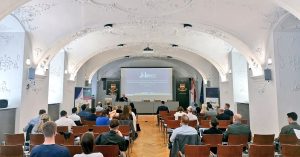The Estonian Police and Border Guard Board (EPBG) team assisted in the implementation of a survey on intelligence sharing/gathering and possible technical means in internal security (including border security). The survey aims to anonymously gather the opinions of LEA partners on the use of technical platforms for intelligence sharing.
The survey is part of WP3: Risk Analysis & Vulnerability Assessment Models and Methodology and aims to assist researchers and technology partners to better understand integrated intelligence sharing practices among EU law enforcement agencies in the field of risk analysis.
The survey questions considered various aspects of intelligence data sharing practices including platforms, their use, functions, and limitations (data privacy, compliance concerns and their purpose is preferred for collection data more than evaluation of intelligence). Information topics were also investigated: human trafficking, irregular migration, drug trafficking, arms trafficking, and the use of false documents. Information sharing among countries and institutions was also discussed.
Preliminary Insights
2. Intelligence-sharing platforms are used by different types of organisations. This has multiple implications. On one hand, it shows the widening of the intelligence function (often in the context of hybrid threats) towards other domains, which in time could improve information exchange among very different types of organisations on issues of public interest. On the other hand, it enables organisations to learn from the experiences of other actors and it allows technological providers of intelligence sharing solutions to develop better and more agile products that can benefit a wider range of customers.
4. Most organisations employ a limited number of platforms. This is often connected to limited organisational resources, but it can be also linked to the process of concentrating intelligence-sharing within the EU (as reflected by the tendency to concentrate on single/dominant platforms in spite of the many offers on the market).
5. Intelligence-sharing platforms are mainly used for: (a) collection and/or distribution of raw information; and (b) preparing analyses and/or sharing analytical products. They are less used for disseminating intelligence to beneficiaries or to evaluate intelligence products. This supports the earlier literature analysis which indicates that the lack of trust coupled with operational and legal challenges make the sharing of final intelligence products much more difficult.
6. The use of intelligence-sharing platforms is unlikely to diminish in the short and medium term. All six respondents (Q14) agreed that such platforms will continue to be deployed in the next 5 years.
8. Intelligence sharing is stronger within the same organisation/same country than it is with foreign partners. This is linked again to the issue of trust (or lack thereof), legal framework or lack of the required infrastructure. The fact that no respondents mentioned intelligence sharing with non-EU countries can be linked to either (a) confidentiality reasons; (b) the fact that intelligence sharing with entities outside the EU is often carried out via EU agencies such as Frontex and Europol.


9. Security and functionality are some of the most important characteristics for choosing an intelligence platform. Out of 7 responses (Q12), 3 mentioned security and 2 included wording associated with functionality. Some respondents also emphasised the fact that they were not aware/did not have a choice in the selection of platform or that they do not know what makes a good intelligence sharing.

Merli Klein
Merli Klein, work as analyst Estonian Police and Border Guard Board (EPBG). Her topics are irregular migration and border security. She is leading WP2: Demand Analysis & Forecasting for Border control Units and Policy makers.
EPBG is developing cooperations with other national authorities, local government units, public organizations, citizens and their communities, and other countries and international law enforcement bodies. There are approximately 5000 people working in the name of internal security of EPBG making it one of the biggest state agencies in Estonia. They bring extensive practical experience in integration of different components of internal security and public safety.

Aitana Radu
Dr. Aitana Radu is the Security Research Coordinator within the Department of Information Policy & Governance. Her research focuses on different aspects of security science, from violent radicalisation to intelligence oversight. Since 2013, Dr Radu has carried out extensive EU-funded research focused on radicalization, law enforcement practices, the implementation of the European Investigation Order, developing security science (ESSENTIAL), fake news (DOMINOES) and intelligence analysis in the contxt of border security (MIRROR and CRITERIA projects). Dr. Radu obtained her M.A. (Comparative Political Science) from the University of Bucharest with a thesis on democratic transitions in the Middle East, her M.A. in the Management of Intelligence Activities for National Security from the National Intelligence Academy with a thesis on the security risks posed by the radical Islamic discourse, and her PhD in Intelligence and National Security from the National Intelligence Academy with a thesis on the transformation of intelligence organizations.
Banner image by Hannes Järvine (EPBG).














